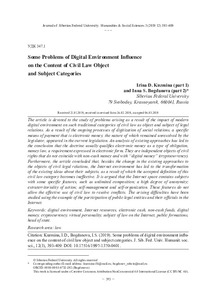Some Problems of Digital Environment Influence on the Content of Civil Law Object and Subject Categories
Скачать файл:
URI (для ссылок/цитирований):
https://elib.sfu-kras.ru/handle/2311/110046Автор:
Kuzmina, Irina D.
Bogdanova, Inna S.
Кузьмина, И.Д.
Богданова, И.С.
Дата:
2019-03Журнал:
Журнал Сибирского федерального университета. Гуманитарные науки. Journal of Siberian Federal University. Humanities & Social Sciences;2019 12 (3)Аннотация:
The article is devoted to the study of problems arising as a result of the impact of modern digital environment on such traditional categories of civil law as object and subject of legal relations. As a result of the ongoing processes of digitization of social relations, a specific means of payment that is electronic money, the nature of which remained unresolved by the legislator, appeared in the current legislation. An analysis of existing approaches has led to the conclusion that the doctrine usually qualifies electronic money as a type of obligation, money law, a requirement expressed in electronic form. They are independent objects of civil rights that do not coincide with non-cash money and with “digital money” (cryptocurrency). Furthermore, the article concluded that, besides the change in the existing approaches to the objects of civil legal relations, the Internet environment has led to the transformation of the existing ideas about their subjects, as a result of which the accepted definition of this civil law category becomes ineffective. It is argued that the Internet space contains subjects with some specific features, such as unlimited composition; a high degree of anonymity; extraterritoriality of action; self-management and self-organization. These features do not allow the effective use of civil law to resolve conflicts. The arising difficulties have been studied using the example of the participation of public legal entities and their officials in the Internet Статья посвящена исследованию проблем, возникающих в результате воздействия современной цифровой среды на такие традиционные категории гражданского права, как объект и субъект правоотношений. В результате происходящих процессов цифровизации
общественных отношений в действующем законодательстве появилось специфическое
средство платежа – электронные денежные средства, вопрос о природе
которых остался законодателем не разрешенным. Анализ существующих подходов
позволил прийти к выводу о том, что в доктрине электронные денежные средства
обыкновенно квалифицируются как вид обязательственного денежного права требования, выраженного в электронной форме. Они являются самостоятельными объектами гражданских прав, не совпадающими с безналичными денежными средствами
и с «цифровыми деньгами» (криптовалютами). Кроме того, в статье сделан вывод о том, что, помимо изменения существующих подходов к объектам гражданских
правоотношений, в результате воздействия интернет-среды происходит трансформация
и сложившихся представлений об их субъектах, вследствие чего принятое определение данной гражданско-правовой категории становится неэффективным. Утверждается, что в интернет-пространстве функционируют субъекты, обладающие
специфическими качествами: неограниченностью их состава, высокой степенью анонимности, экстерриториальностью действий, самоуправляемостью и самоорганизацией.
Эти особенности не позволяют эффективно использовать нормы гражданского
законодательства для разрешения возникающих коллизий. Возникающие сложности рассмотрены на примере участия публично-правовых образований и их должностных лиц в сети Интернет
Коллекции:
Метаданные:
Показать полную информациюСвязанные материалы
Показаны похожие ресурсы по названию, автору или тематике.
-
Проекты цифровой философии в контексте развития Digital Humanities
Груздев, А. А.; Самарин, А. С.; Илларионов, Г. А.; Gruzdev, Andrei A.; Samarin, Andrei S.; Illarionov, Grigorii A. (Сибирский федеральный университет. Siberian Federal University, 2023-07)Цель исследования – посредством сравнительного анализа определить основные формы существования цифровой философии как части Digital Humanities. Гипотезой выступает ризоматическая структура цифровой философии, не ... -
Enhancing Digital Skills: The Key to Digital Inclusion for the Older People (on Example of Vietnam)
Tran Thi Bich Ngoc; Dao Thanh Binh; Nguyen Thi Xuan Hoa; Barysheva, Galina A.; Tran Si Lam; Zhironkin, Sergey A.; Чан Нгок Тхи Бик; Дао Бинь Тхань; Нгуэн Тхи Суан Хоа; Барышева, Г. А.; Тран Си Лам; Жиронкин, С. А. (Сибирский федеральный университет. Siberian Federal University, 2023-10)Digital transformation taking place rapidly in all aspects of socioeconomic activities across Vietnam in recent years is affecting the lives of people of all ages. Vietnamese older people, due to the impact of digitization, ... -
Digital Humanities in the Conservation of Cultural Heritage
Lapteva, Marina A.; Gordeeva, Eugenia A.; Laptev, Alexei A.; Лаптева, М.А.; Гордеева, Е.А.; Лаптев, А.А (Сибирский федеральный университет. Siberian Federal University, 2016-07)The use of digital technologies in science has contributed greatly to the creation of new scientific directions and research aspects. The paper discusses tools, aims, methods and administrative instruments used in Digital ... -
The Digital Transactions Currency for the BRICS
Zharikov, Mikhail V.; Жариков, М.В. (Сибирский федеральный университет. Siberian Federal University, 2020-11)The article deals with the circulation of a digital currency as a worldwide problem. The topic has theoretical and practical significance because price stability, economic growth and development and market equilibrium ... -
Classification and Trends in Developing Digital Services In Russian Federation
Yury, Danilchenko; Natalya, Fedorova; Liudmila, Iushkova; Evgenia, Korepanova; Marina, Savelyeva (2019)The article defines a number of indicators for assessing the development of the digital market, and groups the digital services offered to consumers in the Russian Federation. The main trends and directions of development ...

